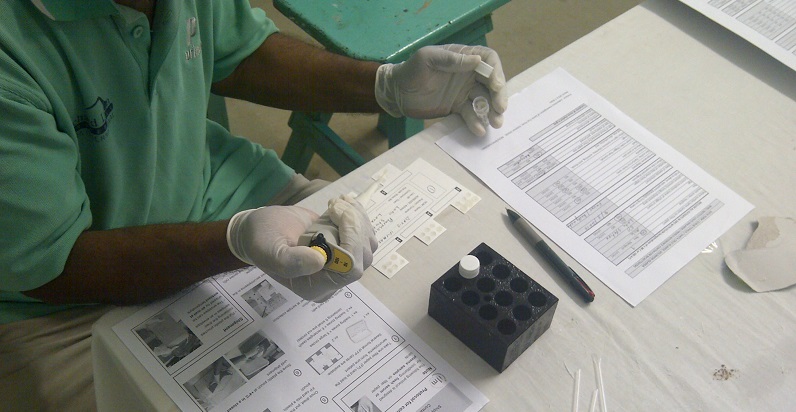-
26 August 2014
Category : Opinion
Response to an epidemiological crisis in Mediterranean countries
José Jaime de Domingo, director técnico del proyecto MEDIPIET en el Instituto de Salud Pública Carlos III, explica en este artículo los objetivos y acciones a desarrollar por el programa que dirige y que tiene como objetivo formar a los países del mediterráneo para intervenir en caso de una crisis epidemiológica.José Jaime de Domingo, Technical Director of the MEDIPIET project at the Carlos III Public Health Institute, explains in this article the objectives and actions to be developed by the programme he directs, which aims to provide training to Mediterranean countries so that they can intervene in the event of an epidemiological crisis.

The recent Ebola epidemic in West Africa, along with other health alerts such as MERS-Cov in the Middle East and the uptick in polio cases being reported in places where the disease had been declared eliminated, demonstrates the importance of developing standardized prevention and control procedures in the region in order to implement a coordinated international response to these public health risks.
As is well known, biological threats do not respect borders, and the notable increase in the movement of people, animals and goods taking place in the world makes us increasingly vulnerable to biological risks.
The Mediterranean Programme for Intervention Epidemiology Training, MediPIET, is a cooperation programme for public healthaimed at training epidemiologists in non-EU Mediterranean countries.
The initiative to create this training programme arises from the request of the member countries for help addressing their shortages of qualified professionals for competently facing epidemiological threats that might affect their countries or neighbouring countries. There is also a need to harmonize the technical response among themselves and with the EU, using common procedures and unified and understandable communication channels, in other words, to speak the same “epidemiological language” throughout the Mediterranean.
The European Commission (EC), as the pillar of the European Union (EU) responsible for carrying out health and cooperation policies for development, is financing the Programme through the Directorate-General for Development and Cooperation (EuropeAid-DEVCO). DEVCO provides the guidelines, synergies and complementarities needed for the programme to be recognized, appreciated and understood by the participating countries. For its part, the DG for Health and Consumer Affairs, DG SANCO, through the European Centre for Disease Prevention and Control (ECDC), has generated and is contributing scientific and technical knowledge to enable execution of the Programme to achieve improvement results with the same quantity and quality as field epidemiologists in the Programme’s partner countries.
MediPIET is a cooperation project in health security within the framework of the EU’s international cooperation policies and of the Stability Instrument[1], through the active participation of the CBRN Centres of Excellence[2], benefitting the following countries: Albania, Armenia, Algeria, Bosnia Herzegovina, Egypt, Georgia, Jordan, Kosovo, Lebanon, Libya, Macedonia, Morocco, Moldavia, Montenegro, Palestine, Serbia, Tunisia and Ukraine. In addition, Israel and Turkey are participating as observers.
Spain is leading the project through a consortium made up of the International and Ibero-American Foundation for Administration and Public Policies (FIIAPP), an institution associated with international cooperation whose main responsibilities in this project are to liaise with the European Commission, carry out technical and logistical tasks, and handle budget tracking; the Carlos III Public Health Institute (ISCIII), associated with the development of public health policies, has the primary task in the project of providing scientific-technical advising for the Programme’s activities, mainly those related to the field epidemiology training.
Within the ISCIII, it is the National Epidemiology Centre that is responsible for the aforementioned tasks, in coordination with the ECDC, the European agency in charge of scientific coordination.
The objectives the Programme aims to achieve are the following:
1. Construct a network of field epidemiologists and epidemiology trainers from the public health institutions of the participating countries in order to strengthen the capacity for responding to threats to public health within the framework of the International Health Regulation.
2. Train field epidemiologists to handle essential public health activities for prevention and control of infectious diseases and other risks, using a common language throughout the region.
3. Promote collaboration, exchange of experiences and knowledge among countries in the Mediterranean basin, and the commitment to the sustainability of national and regional programmes to guarantee the capacities of qualified public health professionals to respond to national and cross-border health challenges.
[1]Finances policies intended to contribute to the preparation for and reaction to crises of natural and human origin, as well as the rehabilitation of countries after a crisis or situation of instability.
[2]CBRN CoE (Chemical, Biological, Radiological, Nuclear Centres of Excellence): an initiative of the EU financed by the Stability Instrument.The views and opinions expressed in this blog are the sole responsibility of the person who write them.






